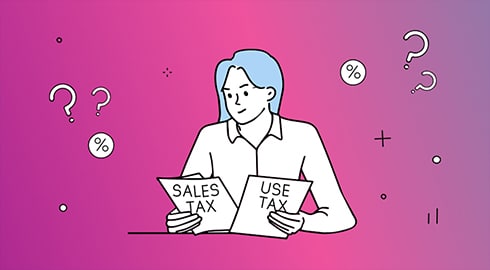The short answer is yes.
Yes, if you’re an online business and have made over 100-200 transactions or raked in over $100,000 in sales in a state where your company isn’t physically located – there’s a high chance you need to start collecting sales tax in those states. It’s called triggering economic nexus, and it’s crucial to a deeper understanding of why online businesses need to collect sales tax.
As we enter the holiday season, we’re taking a retrospective look at the legal landscape of sales tax collection for online businesses, followed by a deeper look at the pros and cons of taxing online companies.
But let’s start with the main developments in the US sales tax compliance landscape in 2023. Spoiler alert alert: It’s been a taxing year, especially for small online companies.
The state of online sales tax compliance in 2023
The regulatory space for sales tax for ecommerce is complex and evolving, driven by technological advancements, changing consumer behavior, and legal precedents.
What were the key developments in 2023?
Economic nexus developments in 2023
Several states have removed or modified the 200-transaction criteria for sales tax collection. some states have removed transaction volume to determine economic nexus and instead rely solely on the gross sales figure
States with No Transaction Threshold for Sales Tax Economic Nexus: (December 13, 2023)
| State | Effective Date | Gross Sales Threshold | Notes |
| Alabama | Jan 1, 2023 | Any sales | No transaction threshold |
| Arizona | Jan 1, 2023 | $100,000 | No transaction threshold |
| Georgia | April 1, 2023 | $150,000 | Transaction threshold eliminated |
| Idaho | Jan 1, 2023 | $100,000 | Transaction threshold abolished |
| Louisiana | July 1, 2023 | $100,000 | Transaction threshold removed, but still needs gross sales threshold |
| South Dakota | July 1, 2023 | $100,000 | Transaction threshold eliminated |
| Vermont | Jan 1, 2023 | $100,000 | Transaction threshold abolished |
States with Removed or Modified Transaction Thresholds for Economic Nexus (December 13, 2023)
| State | Effective Date | Transaction Threshold | Gross Sales Threshold | Notes |
| California | – | Removed | – | Threshold-based solely on gross sales (varies depending on industry) |
| Colorado | – | Removed | – | Threshold-based solely on gross sales (varies depending on industry) |
| Iowa | July 1, 2023 | Reduced to 100 | $100,000 | Maintains gross sales threshold |
| Louisiana | August 1, 2023 | Removed | $100,000 | Threshold-based solely on gross sales |
| Maine | – | Removed | – | Threshold-based solely on gross sales (varies depending on industry) |
| Massachusetts | – | Removed | – | Threshold-based solely on gross sales (varies depending on industry) |
| New Mexico | – | 200 (maintained) | $50,000 | Maintains gross sales threshold and transaction threshold |
| North Dakota | – | Removed | $100,000 | Threshold-based solely on gross sales |
| South Dakota | July 1, 2023 | Removed | $100,000 | Threshold-based solely on gross sales |
| Washington | – | Removed | – | Threshold-based solely on gross sales (varies depending on industry) |
Notes:
- These tables are current as of December 13, 2023. Sales tax regulations are constantly changing, so it’s essential to consult a tax professional for the latest information.
- Some states may have additional economic nexus requirements beyond exceeding the gross sales threshold.
Complyt tip for 2024: Keep identifying states where you may have economic nexus and researching the specific sales thresholds for each state, as more changes are expected next year.
Developments in Marketplace Facilitator Laws in 2023
California finalized Marketplace Facilitator regulations in August 2023, clarifying terms and registration requirements for marketplace facilitators. The regulation also specifies when a marketplace facilitator will be considered a seller and retailer of property.
In 2023, over forty states now enact laws that hold marketplaces responsible for collecting and remitting sales tax for third-party sellers – simplifying compliance for individual sellers by shifting the burden to platforms.
Online companies facing Increased scrutiny
Tax authorities are becoming more sophisticated in tracking online sales and identifying non-compliance. This increases the risk of audits and penalties for online businesses that aren’t compliant. It’s also stretching the resources of smaller online companies, who may be unable to invest in full-time tax experts to stay compliant.
Advancements in compliance for online businesses in 2023
Scalable (and therefore more affordable) automation tools and software solutions like Complyt are helping smaller businesses streamline sales tax compliance processes and comply with complex regulations.
How does online sales tax work?
Are you trying to understand how to keep your online business sales tax compliant in 2024? Every online business needs to comply with their sales tax duties.
‘Online sales tax,’ also known as ‘ecommerce sales tax’ or ‘internet sales tax,’ works similarly to the tax charged in a physical store. It will be a percentage of the price of items you sell and collected by you from your customers.
The only difference between online sales tax and “regular” sales tax is that your customers are online, buying from you in states where your business may not be registered to collect sales tax.
Did your online businesses have to collect sales tax in 2023?
Find out by following these four steps.
1. Determine your tax jurisdiction.
If you’re here because you have an online business, start by identifying your customers’ locations to understand which tax jurisdictions apply to your business.
2. Determining your sales tax nexus
Next, figure out where you have established nexus in each state. If a state has “nexus” over the seller, this means that the state has the right to collect sales tax from your company.
When do you know you’ve triggered any nexus types applicable to an online business?
Here’s a pocket checklist.
| Type of Nexus | Definition | Applicable? |
| Physical Nexus | Your business has a physical presence in a state, such as a store, warehouse, or office |
|
| Economic Nexus | Your business has a significant economic presence in a state, (e.g., $100,000 in sales or 100 transactions) |
|
| Marketplace Nexus | Your business sells through an online marketplace that has a physical presence in a state |
|
| Click-
Through Nexus |
Your business receives a significant amount of referrals from a state, even without a substantial physical or economic presence in the state |
|
| Affiliate Nexus | Your business has a relationship with an in-state affiliate that promotes sales, creating a form of physical presence |
|
Check out the guide to online sales tax by state below.
| Which states must you collect tax in 2023?
Your Complyt Guide to nexus states |
|||||
| State | Click-Through Nexus | Affiliate Nexus | Reporting Requirements | Economic Nexus | Marketplace Nexus |
| Alabama | No | No | No | Yes (threshold of $250,000 or more) | Yes |
| Alaska | No | No | No | No | No |
| Arizona | No | No | No | Yes (current threshold of $200,000; $150,000 in 2020; and $100,000 in 2021 forward) | Yes |
| Arkansas | Repealed | Repealed | No | Yes (threshold of $100,000 or at least 200 separate transactions) | Yes |
| California | Repealed | Repealed | No | Yes (threshold of $500,000) | Yes |
| Colorado | Repealed | Repealed | No | Yes (threshold of $100,000) | Yes |
| Connecticut | Yes | Yes | Yes | Yes (threshold of $250,000 or at least 200 separate transactions) | Yes |
| Delaware | No | No | No | No | No |
| District of Columbia | No | No | No | Yes (threshold of $100,000 or at least 200 separate transactions) | Yes |
| Florida | No | No | No | Pre-Wayfair law requiring physical presence | No |
| Georgia | Yes | Yes | Repealed | Yes (threshold of $100,000 or at least 200 separate transactions) | Yes |
| Hawaii | No | No | Yes | Yes (threshold of $100,000 or at least 200 separate transactions) | Yes |
| Idaho | Yes | Yes | No | Yes (threshold of $100,000) | Yes |
| Illinois | Repealed | Repealed | No | Yes (threshold of $100,000 or at least 200 separate transactions) | Yes |
| Indiana | No | No | No | Yes (threshold of $100,000 or at least 200 separate transactions) | Yes |
| Iowa | Yes | Yes | No | Yes (threshold of $100,000 or at least 200 separate transactions) | Yes |
| Kansas | Yes | Yes | No | Yes (threshold of $100,000 or at least 200 separate transactions) | Yes |
| Kentucky | No | No | Repealed | Yes (threshold of $100,000 or at least 200 separate transactions) | Yes |
| Louisiana | Yes | Yes | Yes | Yes (threshold of $100,000 or at least 200 separate transactions) | Yes |
| Maine | Yes | Yes | No | Yes (threshold of $100,000 or at least 200 separate transactions) | Yes |
| Maryland | No | No | No | Yes (threshold of $100,000 or at least 200 separate transactions) | Yes |
| Massachusetts | No | No | No | Yes (threshold of $100,000 and at least 100 separate transactions) | Yes |
| Michigan | Yes | Yes | No | Yes (threshold of $100,000 or at least 200 separate transactions) | Yes |
| Minnesota | Yes | Yes | No | Yes ($100,000 and at least ten sales or 100 separate transactions) | Yes |
| Mississippi | No | No | No | Yes (threshold of $250,000) | Yes |
| Missouri | Yes (threshold of $100,000) | Yes | No | Yes (threshold of $100,000 or at least 200 separate transactions) | Yes |
| Montana | No | No | No | No | No |
| Nebraska | No | No | No | Yes (threshold of $100,000 or at least 200 separate transactions) | Yes |
| Nevada | Yes | Yes | No | Yes (threshold of $100,000 or at least 200 separate transactions) | Yes |
| New Hampshire | No | No | No | No | No |
| New Jersey | Yes | Yes | No | Yes (threshold of $100,000 or at least 200 separate transactions) | Yes |
| New Mexico | No | No | No | Yes (threshold of $100,000) | Yes |
| New York | Yes | Yes | No | Yes (threshold of $300,000 and at least 100 separate transactions) | Yes |
| North Carolina | Yes | No | No | Yes (threshold of $100,000 or at least 200 separate transactions) | Yes |
| North Dakota | No | No | No | Yes (threshold of $100,000) | Yes |
| Ohio | Repealed | Repealed | No | Yes (threshold of $500,000) | Yes |
| Oklahoma | No | Yes | Yes | Yes (effective 11/1/2019; threshold of $100,000 in aggregate sales) | Yes |
| Oregon | No | No | No | No | No |
| Pennsylvania | Yes | Yes | Yes | Yes (threshold of $100,000 or at least 200 separate transactions) | Yes |
| Rhode Island | Yes | Yes | Yes | Yes (threshold of $100,000 or at least 200 separate transactions) | Yes |
| South Carolina | No | No | No | Yes (threshold of $100,000) | Yes |
| South Dakota | No | Yes | Yes | Yes (threshold of $100,000 or at least 200 separate transactions) | Yes |
| Tennessee | Yes | Yes | Yes | Yes (threshold of $500,000) | Yes |
| Texas | No | No | No | Yes (threshold of $500,000) | Yes |
| Utah | No | Yes | No | Yes (threshold of $100,000 or at least 200 separate transactions) | Yes |
| Vermont | Yes | No | Yes | Yes (threshold of $100,000 or at least 200 separate transactions) | Yes |
| Virginia | No | Yes | No | Yes (threshold of $100,000 or at least 200 separate transactions) | Yes |
| Washington | Repealed | No | Yes | Yes (threshold of $100,000) | Yes |
| West Virginia | No | Yes | No | Yes (threshold of $100,000 or at least 200 separate transactions) | Yes |
| Wisconsin | No | No | No | Yes (threshold of $100,000 or at least 200 separate transactions) | Yes |
| Wyoming | No | No | No | Yes (threshold of $100,000 or at least 200 separate transactions) | Yes |
3. Calculating your sales tax
Done? Great. Once you’ve determined that a state has nexus over your company seller, it’s time to calculate your online sales tax. The tax rate will depend on the state and the type of product you sell. Some states have different tax rates for different categories of goods, like food, clothing, and electronics – complicating this step even more for online retailers.
4. Collecting and remitting the tax
Your company is legally responsible for collecting and remitting the sales tax to the appropriate state government agency. This can be done electronically through state online portals or by filing paper returns.
To ensure compliance, online sellers must stay informed about the latest changes in online sales tax laws and regulations. Or you can use automated US sales tax software like Complyt that does the heavy lifting for you – in a fraction of the time.
Comply tip: Why not simplify this process by booking a demo and letting us confirm your nexus?
The pros of online sales tax collection
+ Let’s start with the bigger picture
Sales taxes are a serious source of revenue for states. Online sales tax collection helps states and local governments recoup lost revenues. These funds are reinvested into infrastructure projects, education, and other public services supporting local economies, creating jobs, and stimulating American economic growth.
How much do online businesses contribute to the greater good? Global marketplaces like Amazon, eBay, and Etsy sold over $3.25 trillion in goods in 2022, with third-party sellers responsible for most of these sales.
+ Taxing online businesses levels the playing field
The price advantage of online retailers over brick-and-mortar stores is being erased thanks to online sales tax. Traditional stores will feel vindicated, having long argued for a fairer marketplace for all businesses and struggling to compete with online competitors eating away at their market share.
+ It’s simplifying sales tax compliance
Currently, businesses must comply with a complex patchwork of state and local sales tax laws. A uniform online sales tax system would simplify business compliance and relieve many smaller companies from their high admin costs. Developments in economic nexus in 2023 are steps in the right direction towards greater clarity and consistency in tax regulations for online businesses.
+ More efficient revenue collection
Collecting tax online can be more efficient than collecting traditional sales tax, as it can be automated and integrated into online sales platforms. It also reduces tax evasion by ensuring that all sales are taxed, whether online or in-person – closing that legal loophole before the 2018 Supreme Court decision in South Dakota v. Wayfair, Inc.
+ It’s fairer to customers
Consumers residing in states that impose online sales tax are required to pay this tax, whereas those in states without such a tax are exempt from it. This isn’t fair to all customers. Collecting sales tax online ensures that all consumers pay the same price for the same goods, regardless of where they live, contributing to a more equal society.
The cons of online sales tax collection
– Price increase for consumers
Imposing taxes on online sales could cause consumer prices to rise, as businesses offset the additional tax expenses by passing it on to their customers. Some argue that it could discourage online shopping, negatively impacting economic growth.
Also, low-income consumers may be disproportionately affected by online sales tax, as they are more likely to shop online for deals and lower prices – exacerbating existing social inequalities.
– Increased cost of compliance
Staying compliant with complex tax regulations and a framework of over 13,000+ different sales tax jurisdictions is becoming impossible to navigate without companies of all sizes needing to invest in sophisticated tax calculation and reporting systems.
– It doesn’t necessarily create a level playing field
The absence of a unified federal sales tax framework for online sales makes compliance a complex and confusing challenge for businesses. States have wide latitude in setting tax rates, payment schedules, and criteria for taxable transactions.
The current patchwork of state-by-state tax laws for online sales also raises concerns about potential disparities in enforcement across states, which could disadvantage certain businesses or regions.
– It could put the brakes on e-commerce growth
An economics professor at the University of Chicago studies how sales taxes influence e-commerce, especially their impact on online prices and consumer behavior. “Charging sales tax is the same as increasing the price of a product or service,” says Austin Goolsbee. “If you increase prices, people will stop buying.”
Tax compliance is more complex for small online businesses than ever
Small and medium-sized online businesses need help with state and local tax compliance, especially if they sell nationwide.
The National Federation of Small Businesses reports that small businesses face tax compliance costs 67% higher than large businesses, equating to substantial paperwork expenses of $74.24 per hour. The complex and inconsistent online tax environment hampers small businesses’ growth, job creation, and contribution to economic prosperity.
While sales tax for ecommerce is leveling the playing field between traditional and online retailers, a more streamlined and uniform approach to tax compliance in the current regulatory space is needed for small businesses to thrive and contribute to the broader economy.
Complyt makes internet sales tax more straightforward and cost-effective for small businesses
What if you didn’t have to worry about sales tax and stayed 100% compliant in each state you’re selling to? You can. Plus, Complyt is scaleable, making it affordable to put your online sales tax compliance on autopilot. (Especially if you’re a small business.)
Book your demo or free tax assessment today.









